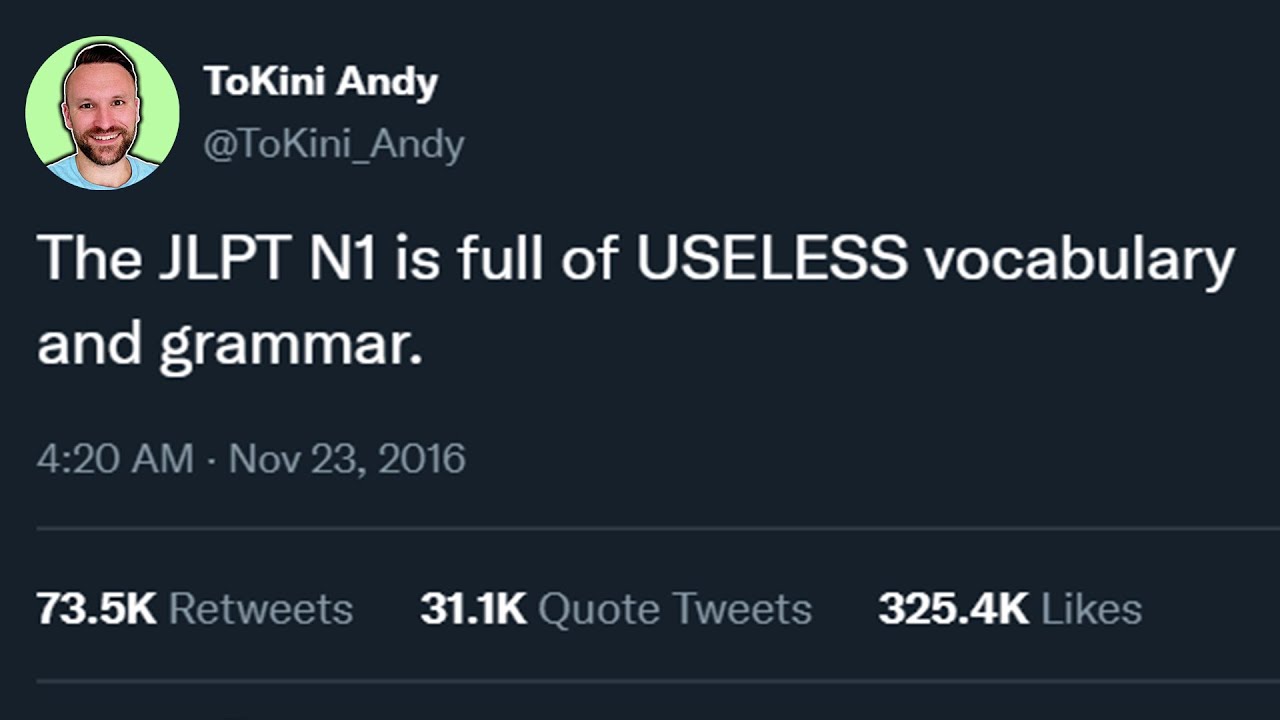I took the N1 and passed it in July 2022, and the specific bit I’m thinking of is grammar, not vocabulary. Also, I said ‘within a short period’. Tokini Andy was in his 11th year since starting Japanese, and he’s married to a native speaker, lives in Japan, and is doubtlessly fluent enough to regularly interact with the language at an advanced level. I also expect that he had a very significant commitment to Japanese during that time. Despite all those advantages and that experience, he said, in the video you posted, that he had only encountered certain structures and words (ざるを得ない and たちまち specifically) six months before the test. I took my N1 after four years of Japanese during which I was consistently very busy (30-35h/week of classes for three of them, not counting the studying and homework I needed to do after class), with my main advantage being my kanji knowledge. I hadn’t had much time for reading with the exception of monolingual dictionaries, pages on the Japanese language (teaching sites, articles on keigo and business language usage), and had mostly been immersed in Japanese via anime (which was also the source of most of the words I looked up in monolingual dictionaries. That’s the maximum level of immersion I’m considering as ‘within a short period’. I think that both Andy’s and @Vanilla’s experiences show that you should know plenty for the test if you read enough, but if you don’t (like me), you’ll be in worse shape because the language on the N1, as far as I can tell, is still literary. You’ll find it in books especially, and perhaps also newspapers, but to a lesser extent. I’m not so sure about elsewhere. (The spoken language in the listening section probably turns up on the news and in formal conversations, from what I’ve listened to so far.)
Moreover, if we assume the N1 scores reflect similar levels of achievement regardless of the test session, I think the differences between my scores and Andy’s scores clearly reflect what I said about grammar/vocabulary versus the rest when it comes to acquiring knowledge through immersion. Here are Andy’s, from this N1 score reaction video:
In contrast, I had something like
| Section |
Score |
| Language Knowledge |
51/60 |
| Reading |
25/60 |
| Listening |
43/60 |
| Vocabulary |
A |
| Grammar |
A |
| Total |
119/180 |
(Yes, my total score is trash, I know, and I’m not proud of it at all.)
I had maybe a week for focused JLPT study before my test, nothing more, and the only thing I consistently studied until the test (properly focused or not) was grammar with the SKM series. I know with full confidence that I got at most five of the grammar questions wrong, because everything else was fairly obvious. For vocabulary, I know my score was entirely due to giving myself time to make good guesses based on kanji and reasoning by analogy, sacrificing the reading section in the process. However, so, as you can see, with less listening experience than Andy (but still a substantial amount), I got a similar score. With definitely far less reading experience and intentionally sacrificing the time I had allocated for the reading section, I scored far worse for reading (and I think my reading speed did pull me down). However, I scored much better for language knowledge, definitely partly due to vocabulary, but I think grammar contributed as well. This is in contrast to my first N1 practice test (the sample test I had included fewer questions than the actual test though), where I got zero for grammar (all the sample grammar questions were strictly N1 level – nothing that often features on N2 guides, which is a good portion of what I saw on the real test) and maybe 60% for vocabulary despite not putting myself in time-restricted exam conditions.
What I’m trying to show here is this: nothing beats getting enough immersion for improving reading and listening ability, but even with relatively little immersion, you can get massively improved grammar scores through focused N1 grammar study. I think the same improvements can be achieved for vocabulary through focused study of vocabulary or kanji books, but I’m not sure if it’s as efficient. (Most likely it isn’t.) Maybe my way isn’t the only way to achieve a good score – lots of immersion with time spent looking stuff up is probably better – but if you don’t have enough time for immersion before the N1, I think specific study is necessary, or at least quite effective, especially for grammar. The point here isn’t that N1 stuff is super obscure or useless, but rather that you won’t encounter a lot of it (i.e. a decent variety of the stuff) without going fairly deep into immersion at the advanced level.
Oh yeah, one thing I forgot to mention: the JLPT likes to pepper the entire test with N1 grammatical structures, so knowing structures also boosts your basic comprehension of the other sections as well.

